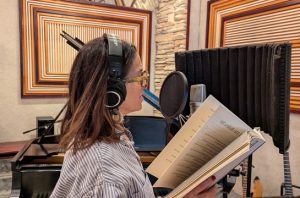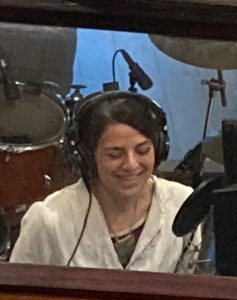Creating an Audiobook
On the day in February, my publisher has booked a four-hour session for me to record The Flaws in the Story, my latest book of poetry. I take the 1 train and make my way to a recording studio in the sketchy area of Midtown Manhattan on the edge of the Garment District. The image I found for the book’s cover is by Vuillard, whose muse (his mother) was a seamstress.[1] The first poem in the collection includes an image of “disappointing threads,” and a review entitled “Woven Song” describes the collection as “built from epic running stitches.”[2] The epigraph I chose for the book is the passage from the Odyssey (Book 2) that describes Penelope’s famous subterfuge for keeping the suitors who are occupying the palace in her husband’s absence at bay. She will decide among them, she tells them, once she’s completed the shroud she’s making for her father-in-law, Laertes. “Then day by day she would weave at the great web, but by night would unravel it….”
The weaving and unweaving of the shroud is one of those mysterious, irresistible symbols you can pick apart forever. At its most expansive, it represents the cycle of life and death itself. One of the things I respond to is how it embodies the feeling and futility of waiting while also buying her time. The shroud is as much for her marriage to Odysseus as it is for Laertes (who, by the way, is neither dead nor dying), since its completion would leave “circumspect Penelope,” as she’s called, defenseless against the suitors, that is, she’d have to marry one. Weaving and unweaving is her way of protecting her marriage and keeping her love for Odysseus alive. It embodies her intuition that Odysseus has only lost his bearings, or been waylaid, and that he will find his way home to her. It’s a metaphor for the inner dialogue she is conducting between the hopes she entertains regarding Odysseus and his return, and the fears she harbors about what’s keeping him.
As I emerge from the 42nd Street subway into the milky, late-winter morning, I think about how the closest I’ve ever gotten to the inside of an honest-to-goodness recording studio, apart from movies and in my dreams, was recording a poem for a poetry anthology CD at the RNIB, the Royal National Institute of Blind People, in London. As it happens, the catalyst for this audiobook was the blind neuromuscular massage therapist in Florida recommended to me by my sister.
I had ruptured a disc in a banana peel moment on the ice a few weeks before Christmas and, the weird limp and shooting pain aside, my trainer and I had discovered that my nervous system had developed amnesia when it came to lifting my left heel off the ground to stand up on my left toes, or else the nerves receiving the signal had gone deaf.
You have to see John next month when you visit, my sister told me. He’s clairvoyant. Maybe it’s because he sees with his fingers, but he can untangle the knots and snarls no one else seems to be able to find.
I agreed to let her book me an appointment. A few weeks later, at the end of the session, I slid off the table and, having all but lost faith in the prospect of liftoff, halfheartedly gave it a try. Up went my left heel, just like riding a bike.
It’s a miracle! I said to John, when I found him in the kitchenette of his office suite. He seemed pleased, but unsurprised, and I became as regular a client as someone living in another state can.
During a subsequent session, having learned about my new collection from my sister, John asked me if I was planning on recording it. An avid reader, John is an ardent proponent of audiobooks.
They’re so much more convenient and accessible than Braille, he told me, and, in part, that’s because listening to books isn’t just for blind people and small children anymore. All my clients want to listen to books these days. They want to “read” while they’re walking or exercising or cooking or just sitting with their eyes closed. Everyone has finally caught on to the pleasures of listening—he paused to take a beat—at least to books. (John is funny.) You should really consider making one, he concluded. Poetry seems like a great fit. And if you do, I’ll be able to read your poems.
When the elevator doors open onto the eleventh floor, I am a little deflated by the sight that greets me. The corridor is about as far from glamorous as raw cement walls and dulled linoleum tiles can get; the windowless, steel doors along the narrow corridor are unceremoniously numbered, like a dingy motel. Across the threshold of door 1107 is a standard issue waiting room where the efficient-sounding woman in a beige sweater manning the reception desk is on the phone, so I sit down on the sofa and try to summon up Judi Dench narrating Winnie-the-Pooh. Our go-to on long car rides when my children were little, it remains for me the paragon of audiobook narration, the just-right energy and pacing and sangfroid I want to bring to my recording.
Once she’s off her call, Michelle signs me in and takes me on a tour of the coffee machine and the water cooler.
Adam will be your engineer this morning, she says, shepherding me down another hallway. He’s great. You’ll be in here, in the Ivory Lounge.
The Ivory Lounge is an improbably perfect mix of glitz and tack, glass brick and upholstered walls, American Hustle-era caramel, mahogany and the promised ivory decor. Adam sets me up behind the mic and music stand, between a baby grand and a drum kit. Somehow, this fifty-square-foot room on the eleventh floor of this nondescript building is cooler than anything I could have imagined.
 I’ve given plenty of live readings, but reading and recording an entire book of poems is different. It’s not just that it took us nearly the full four hours we had booked to get through the session that would result in a two-hour listen, though the focus I needed to keep up the illusion, the feeling, of freshness and discovery that I look for in a performance, was grueling. It was more that it was like reliving a part of my life, not the way a story or a photograph calls up memory, but from the inside, as if there were still a chance to do it some other way. It was also, definitely, a little bit rock ’n’ roll.
I’ve given plenty of live readings, but reading and recording an entire book of poems is different. It’s not just that it took us nearly the full four hours we had booked to get through the session that would result in a two-hour listen, though the focus I needed to keep up the illusion, the feeling, of freshness and discovery that I look for in a performance, was grueling. It was more that it was like reliving a part of my life, not the way a story or a photograph calls up memory, but from the inside, as if there were still a chance to do it some other way. It was also, definitely, a little bit rock ’n’ roll.
When I emerge back onto the streets it is early afternoon and I decide to walk home. It’s not a matinee day and the neon marquees of Broadway are quiet, but my head is buzzing. I think about what John’s experience of the theater would be like, how much more he’d hear, his blindness being proof against the distractions of what the sighted have to contend with when the lights come up. I think about blind Homer’s insight being paradigmatic of poetry. I consider in what ways this is related to intuition, which I imagine, like insight, as a place we feel our way to with our eyes closed. Maybe that’s only because it’s invisible, but I think it’s also because we get there only when we try to let go of the modes of perception we rely on most.
You don’t have to close your eyes to get in touch with your intuition just as you don’t have to be blind to be a poet, but you do have to keep the distractions at arm’s length to be able to home in on what’s really happening. I wonder if prose tends to operate according to the logic of reason, and poetry to that of intuition. It seems related to the way prose subordinates its music to its message, while poetry searches out the place where words and music start to become indistinguishable from each other.
As I walk past the dark theaters, I think how reading and watching plays taught me to see that it was possible to intuit the story of a relationship from a snippet of dialogue. The majority of the poems in The Flaws in the Story take the form of one kind of dialogue or another and are steeped in my intuition that it’s in our conversations with each other that the flaws in our relationships reveal themselves. Not all flaws are fatal, of course. There are many, for better or worse, we just live with. But some can be like Persian flaws,[3] the human imperfections that show us what is most beautiful about the whole, while others become the loose thread we cannot stop tugging at until everything unravels and rips us apart.
And that brings me back to “circumspect Penelope.” She has often been seen as the pattern of loyalty and patience. That’s not how I see her. To me she’s Homer, the character with the panoramic, “epic” view, the poet who knows what she can’t see—where her husband is, what he may be doing, “the future”—but who holds fast to her intuition that he will return to her, and that when he does, she will be able to discern whether their love has withstood its ordeal.[4] It’s this intuition that enables her to strike the balance between the fears she must, like the importunate suitors, put on mute, and the fears she needs to listen to.
And that brings me back to my audiobook. In all human societies, the earliest poems were recited, sometimes accompanied by music, interwoven with other forms of ritualized and ceremonial recitations. Listening to them was how people assimilated the DNA of their culture and came to understand what made them them. At the same time, our dominant sense has probably always been vision. It could be from this doubleness, this tension, that we derive the feeling that we know more than we think we do, and that we call “intuition.” By all means, read my book with your eyes if you are able. But even if you can, think about reading it with your eyes closed.
[1] Cumming, L. (2018). Vuillard and Madame Vuillard review – all about his mother. [online] the Guardian. Available at: https://www.theguardian.com/artanddesign/2018/oct/21/vuillard-and-madame-vuillard-review-barber-institute-birmingham.
[2] johnfield1 (2024). Woven Song—Liane Strauss’s ‘The Flaws in the Story’. [online] Poor Rude Lines. Available at: https://johnfield.org/2024/05/30/liane-strausss-flaws-in-the-story/.
[3] Irani, N. (2024, October 13). The Persian flaw. NEIL IRANI. https://neilirani.com/index.php/2024/10/13/the-persian-flaw/
[4] See Homer, Odyssey, Book 23, where Penelope tests Odysseus about their marriage bed (i.e., their marriage).
Liane Strauss is the author of four books of poetry. Her most recent collection, The Flaws in the Story, was chosen by Mary Jo Bang as the winner of the 2023 Marsh Hawk Press Poetry Prize. “Living Proof and Other Poems” was the runner-up for 2024 Missouri Review’s Perkoff Prize. She writes the Substack How To Read a Poem: A Love Story.


